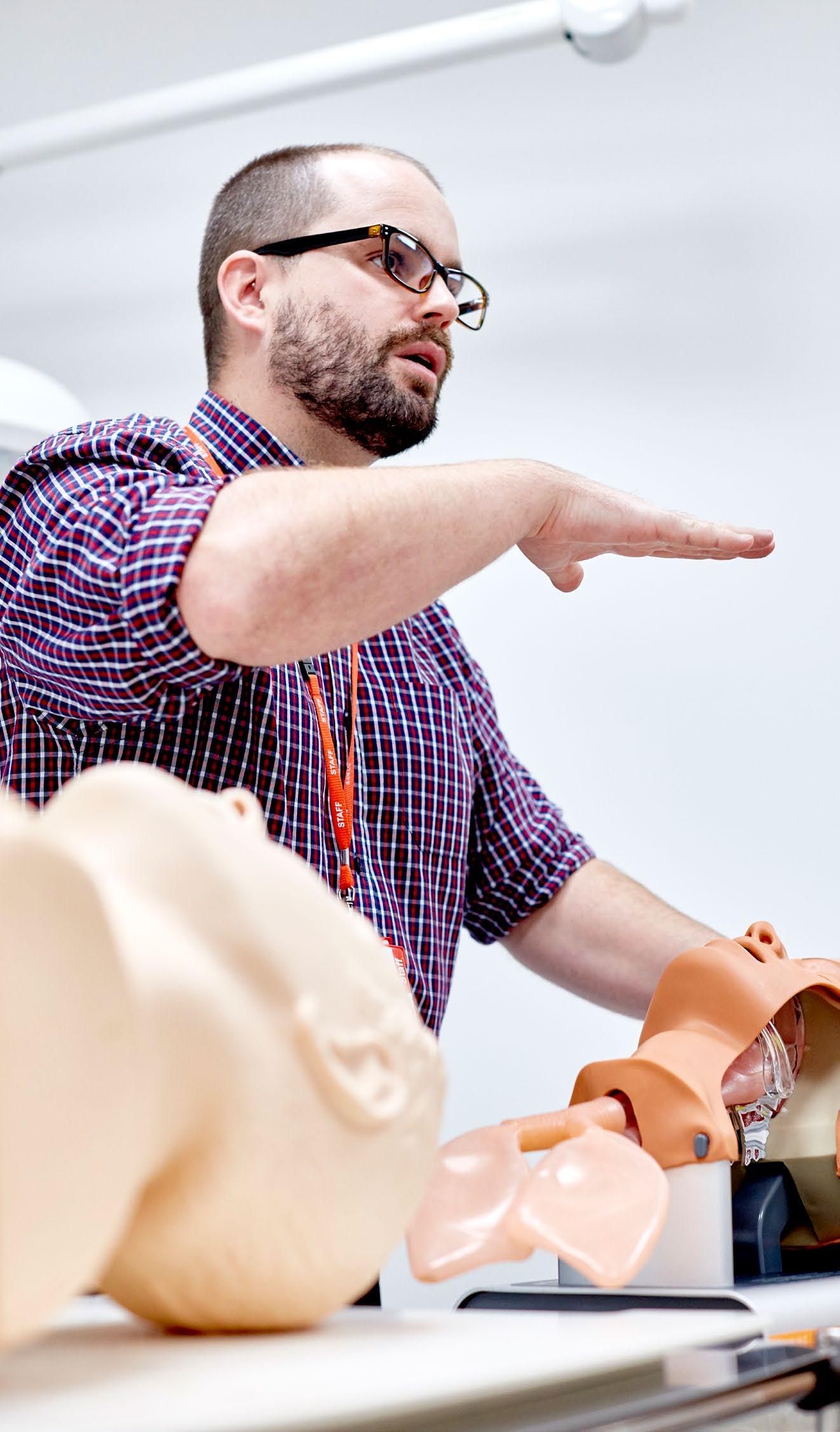










It gives me great pleasure to welcome you to the School of Nursing, Midwifery and Health Education at the University of Bedfordshire.
Studying to become a nurse is a real privilege but at the same time can be a challenge. Very few careers give you the opportunity to make a real difference to the lives of the individuals you will give care to and to their extended family. As you develop your professional knowledge and skills, you will discover that the nursing care that you provide will give you a real sense of fulfilment and a continuous desire to improve in your chosen sphere of practice. Once qualified there are numerous pathways that you can follow in clinical practice, research and or education. I urge you to open your mind to the potential of the two or three years ahead of you as you gain the skills required to become a Registered Nurse and remember to enjoy the journey ahead of you.
With best wishes,
Dr Barbara Burden Head of School of Nursing, Midwifery and Health Education
Welcome to the University of Bedfordshire and the start of your pre-registration Mental Health Nursing course.
The course is challenging and does require hard work and commitment, both on a personal and professional level. We hope that you will have fun throughout the course and make lifelong friends too.
You will be well supported during the course, both in the University and during your time in practice. Our aim is that you will find the course enriching and that you develop throughout the three years.
This booklet has been designed to help you at the beginning of the course and contains information to support you as you get started.
Wishing you all the best, Marlon Bridgeman BSc Mental Health Nursing Course Coordinator

During Induction, you will be allocated a Personal Academic Tutor (PAT) for the duration of your studies; in Nursing we operate a tutorial group system which allows you to make strong connections with your peers early in the course.
Your personal academic tutor is Email
Please read the PAT policy so you can see how we will be able to support you.
The Course Lead and Course Coordinator are supported by Senior Lecturers who will be able to help you with any course related concerns:
Mental Health Nursing Team
Marlon Bridgeman marlon.bridgeman@beds.ac.uk
Valerie Freestone Valerie.freestone@beds.ac.uk
Joyce Rambanepasi joyce.rambanepasi@beds.ac.uk
Dr David Solomon david.solomon@beds.ac.uk
Elizabeth Ogunsemo BukolaElizabeth.Ogunsemo@beds.ac.uk
Joseph Sengu Joseph.sengu@beds.ac.uk
Christiana Joseph Christiana.joseph@beds.ac.uk
Iram Aziz Iram.aziz@beds.ac.uk
Joanne Wilder-Harris joanne.wilderharris@beds.ac.uk
The University offers a wealth of support including advice about money, academic support, mental health services and much more. beds.ac.uk/student-support mentalhealth@beds.ac.uk
These services and much more can be accessed through the Student Information Desk (SID) beds.ac.uk/sid sid@beds.ac.uk
Treehouse Community & Faith Centre
The Student Union also offers support and advice as well as many social opportunities. bedssu.co.uk help@bedssu.co.uk

The following is a typical Welcome Week schedule:
Day 1
• Professional Statutory and Regulatory Bodies (PSRBs) checks such as Disclosure and Barring Service (DBS) checks
• registration
Day 2
• welcome from key staff
• introduction to student services
• overview of your course from staff and current students
Day 3
• introduction to BREO – a collection of online tools to help and support you with your studies, course and practice handbooks
• introduction to Personal Academic Tutors (PATs)
• uniform policy (and ordering)
• professional expectations
• campus tour
• practice placements – meet the staff
ESSENTIAL LINKS
For more information on joining your course, visit Begin BSc Mental Health Nursing @Beds where you will find updated info, tips and dates of your course induction week etc.
YEAR 1 STUDENTS WILL BE STUDYING
Year long unit
Care across the life span in Mental Health Nursing
Semester 1 Academic skills
Semester 1&2 Understanding health
Semester 2
Semester 3
Introduction to nursing interventions
Exploring health
How to find your Timetable
Information about your learning with BREO
Study Hub is the Library academic support service, a one-stop-shop for any academic, resourcing or general IT assistance to create the best assignments you can.
Visit the Library
Begin@Beds Start your student journey
Thrive@Beds My Beds Life
Succeed@Beds Careers and Employability Service

The course takes place over three years with 50% theory and 50% practice. Over the three years you will have a number of practice experiences, allowing you to complete the three parts of the course. These are recorded in practice documents (these are called MYEPAD and OAR documents).
The Nursing and Midwifery Council (NMC) require you to complete 2300 hours of practice over the three years to enable you to qualify for registration.
Attendance for theory sessions are also monitored and if sessions are missed these could affect your place on the course.
As you enrol on your professional course you will need to complete an enhanced DBS along with ID checks and an occupational health assessment. It is recommended that you apply for the ‘update service’ when you initially complete your enhanced DBS.
During induction you will be reviewing the Partnership Learning environment Agreement (PLEA) and uniform policy. Together with the Nursing and Midwifery Code of Conduct www.nmc.org.uk/standards/code/ these will support you in maintaining a professional outlook throughout your course.
Placements for Mental Health Nursing students, depends on your base campus, either Aylesbury or Luton. However, both sites offer a range of experiences in the following areas:
• Acute admission wards
• Older People’s wards
• Community Mental Health Teams
• Children and Adolescence Mental Health
• Psychiatric Liaison Services
• Crisis and Home Treatment Teams
• Secure services
• Prisons
• GP surgeries
Please do bear in mind travel costs and time. You are responsible for getting to placements and classroom sessions on time.


The course assessment strategy is closely aligned to the teaching and learning strategy which is designed to:
• have an immediate relevance to practice;
• draw on expertise-by-experience;
• foster active learning and be learner-centred in approach.
A distinct feature of the course is the range of assessment tasks that can have an immediate impact in practice. This helps put into practice what you are learning in university and increases your self-confidence.
There are a number of different types of assessments which are used throughout the course:
Essay assignments
Digital narrative
Artefact Presentations
Simulated assessment
Exam
In class test
Please don’t go out and buy lots of text books; each unit will have a reading list and the vast majority of material is digital. The libraries are well stocked and if you do find a favourite text book then look at Ebay or Amazon for second hand copies.
• Nursing – UCAS Subject Guides
SOMETHING TO READ
• Your first placement
SOMETHING TO EAT
• Eating and drinking on-campus – University of Bedfordshire
ABOUT THE CAMPUS
• Luton
• Aylesbury
• Here is a message from Jack, one of our recent students

The course is 42 weeks per year with 21 theory weeks and 21 practice weeks. The course plan is broken down into 3 semesters and you will have blocks of theory and blocks of placement each semester. Theory and practice weeks are both 37.5 hours long. You are likely to be in theory for 3 days each week during theory blocks with an additional 2 days as guided/independent study. However, on occasion, you may need to be in theory for 4 days, as you will need to undertake Moving and Handling and Basic Life Support theory and Practice prior to attending placement.
Mon Tue Wed Thu Fri
9am
10am
Guided study
Professional identity
Guided study Guided/ independent study
Academic skills
Human structure function and exercise
Guided study
11am 12pm LUNCH
Academic skills
1pm LUNCH LUNCH LUNCH
Professional identity
Guided/ independent study
Manual handling ADL suite Human structure function and exercise 2pm
Guided/ independent study 3pm 4pm
Academic skills
Guided/ independent study
Guided/ independent study 5pm
Guided/ independent study

Are there any items I need to buy for the course?
Yes. You will need lots of black pens as these always go missing! A small notebook for making notes in practice. A small basic calculator for drug calculations. A fob watch. Black wipeable shoes – we will discuss the best types with you. These cannot be canvas type shoes.
Can I choose where I undertake my practice experience?
No, these are allocated either by the placement team or the Trust. You will undertake a variety of placements in both hospital and community settings.
When do I find out which placement area I have been allocated?
We aim to provide students with their placement locations as quickly as possible once these have been confirmed with the Trusts.
Do I have to work shifts?
Yes, you are expected to work a variety of shift patterns. These include: days, nights and weekends. We have a Practice Learning Handbook
which has all the rules as to how many nights or weekends you can do.
Can I arrange shifts around my childcare needs?
Unfortunately not, you will need to be able to work a 7 day, 24 hour shift pattern for the duration of the course. You will also need to be able to travel to placements which may have start times of 7am and finish times of 8pm.
Will I be able to practise skills before I attend placement and work with actual patients?
Yes, you will have scheduled simulation based learning included in your teaching plan and this will provide excellent preparation for placement.
What if I have a problem in placement?
We have link lecturers who will come into placement each month. We also have Practice links who will contact the team if they are concerned about a student or if a student has been caring for a sick child, and they feel the student needs more support. Please do not feel alone as there is always someone in practice who
can help you and the University staff are just an email away!
How many others are on my course?
We usually have around 27 Mental Health Nursing students per year, per campus. You are sometimes taught with the Adult Nursing students, which helps develop views of students in a different field of nursing.
What happens if I miss class due to being unwell or having difficulties with childcare or travel?
We understand that everyone will face some difficulties now and again and we aim to be flexible. You are encouraged to discuss ongoing issues with your Personal Academic Tutor or Unit Lead.
What support is there if I am struggling?
There is support in many forms; SID, your PAT, Unit leads, Course Lead and Student support offer support and advice on anything from money to academic support to health and wellbeing.
What funding is available?
Student Finance may be able to help with funding or childcare costs. There is also the NHS Bursary that you may be eligible for.
I am awful at maths and worried about doing drug calculations. What can I do?
In your lectures you will be shown how to calculate medication doses. You may find a Drug Calculation textbook helpful. Keep practicing and we will help support you.
Are there clubs and activities I can get involved with?
Yes! The Student Union will provide lots of information about the sporting clubs, activities and events available for all students at UoB. For more information visit bedssu.co.uk
ESSENTIAL LINKS
Simulation suite beds.ac.uk/simulation
Learning Difference support information beds.ac.uk/student-support/disabilities2
There is a lot to take in when you begin studying on a professional course like this one. The teaching team have been working as mental health nurses for many years and here are some of our key reasons to ‘love this job’!
Everyone is helpful and wants you to do well.
• Try to be organised – it does help to note down all essential dates for assessments and key training.
You are given the opportunity to be a part of a unique experience every day. The satisfaction you get from knowing you helped make a real difference to a patient is amazing. You can keep studying after you qualify and there is no limit to the knowledge you can gain. You will one day be the ‘teacher’ and the mentor responsible for helping a new student on their first day. You will be with patients in their most vulnerable moments. This is a true privilege.
You will experience things you never thought possible.
No two days are the same.
You will always be employable as mental health nurses are always in demand.
• Ask your PAT if you have a query about something and you are not sure who you should ask.
• Make use of the library and Study Hub – they are there to help you succeed in your studies.
• Seek help sooner rather than later. We are always willing to help yoU.
• Don’t suffer in silence… speak up.